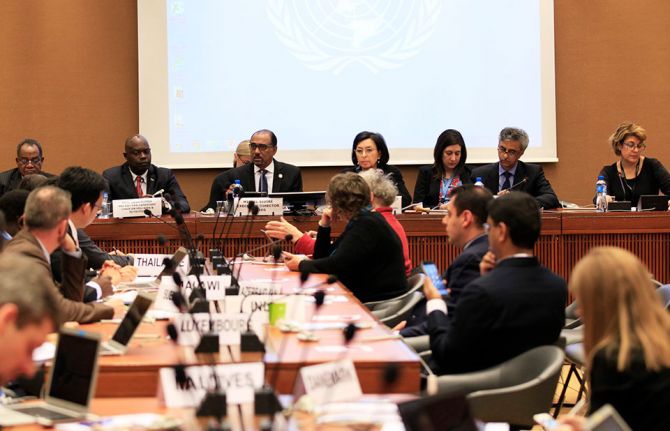

Update
Commemorating Zero Discrimination Day at a panel on HIV and human rights
05 March 2018
05 March 2018 05 March 2018The importance of confronting stigma and discrimination in order to end the AIDS epidemic by 2030 was the subject of a panel discussion on 1 March, Zero Discrimination Day. Representatives of UNAIDS, Brazil, India, Malawi and the Global Network of People Living with HIV (GNP+) highlighted good practices and appealed for action and leadership to protect and advance HIV-related human rights.
In his address, the Executive Director of UNAIDS, Michel Sidibé, called for global efforts to address HIV-related barriers, discrimination and gender inequalities, which continue to leave millions of people behind. He pointed to the human rights tools and mechanisms available as outlined in a special issue of the Health and Human Rights Journal on HIV and human rights launched that day.
Deus Gumba, Malawi Parliamentary Chair on HIV/AIDS and Nutrition, spoke about Malawi’s experience in working with stakeholders to develop a progressive HIV and AIDS Bill in 2017. Rajiv K. Chander, the Permanent Representative of India to the United Nations in Geneva, expressed India’s dedication to advancing zero discrimination in the response to HIV. He emphasized India’s leadership in ensuring access to affordable HIV treatment and adopting legislation prohibiting discrimination against people living with HIV.
The address on behalf of Laurel Sprague, Executive Director of GNP+, was delivered by Andrea Boccardi. She called on stakeholders to join a global compact to end HIV-related discrimination, an effort spearheaded by civil society.
A discussion followed in which representatives of other countries voiced their support to scaling up efforts in order to ensure accountability and action in the response to HIV.
The event was held on the sidelines of the 37th session of the Human Rights Council, held in Geneva, Switzerland.
Quotes
“If we don’t address the structural barriers, if we don’t change the policies, if we don’t make the laws more conducive, it won’t help us to reach people living with HIV. We can’t end the AIDS epidemic without zero discrimination. Zero discrimination is more than a vision, it is an obligation.”
“Stigma and discrimination and punitive laws that violate against key populations deepen people’s vulnerability to HIV and violate human rights.”
“I do believe the 90–90–90 targets and the goals of eliminating HIV as a public health threat by 2030 can only be achieved if HIV prevention, treatment, care and support services are delivered in an environment free of stigma and discrimination.”
“Ensuring access to affordable HIV treatment without discrimination is critical to realizing full equality and to save lives.”
“We must have accountability for human rights because the rights of everyone matter: we need to realize rights for everyone to be able to lead a life in dignity and equality.”



